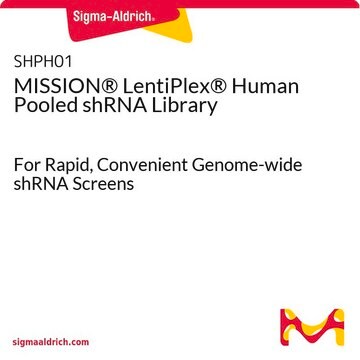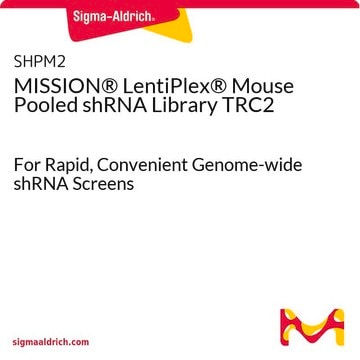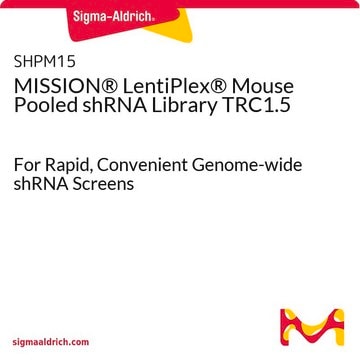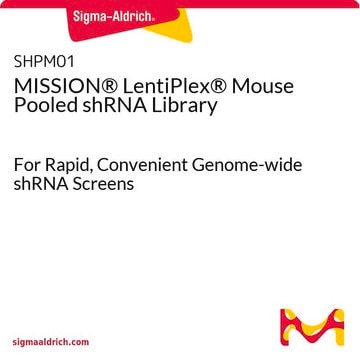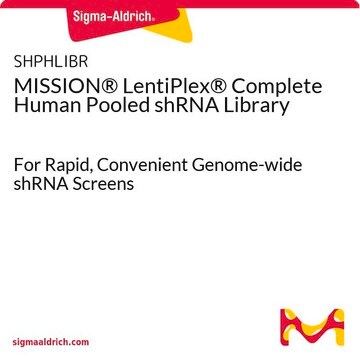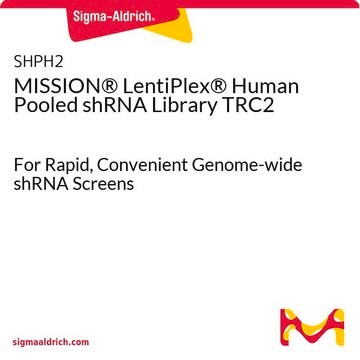Alle Fotos(1)
Wichtige Dokumente
SHPH15
MISSION® LentiPlex® Human Pooled shRNA Library TRC1.5
For Rapid, Convenient Genome-wide shRNA Screens
Anmeldenzur Ansicht organisationsspezifischer und vertraglich vereinbarter Preise
Alle Fotos(1)
About This Item
UNSPSC-Code:
41105904
NACRES:
NA.51
Empfohlene Produkte
Qualitätsniveau
Produktlinie
MISSION®
Konzentration
≥5x108 VP/ml (via p24 assay)
Methode(n)
capture ELISA: 5 x 108 TU/mL using p24
Versandbedingung
dry ice
Lagertemp.
−70°C
Verwandte Kategorien
Allgemeine Beschreibung
MISSION LentiPlex Pooled Libraries bring the power of the MISSION TRC shRNA collection together with Sigma′s lentiviral manufacturing expertise to enable genome-wide RNAi screens at your bench-top. The LentiPlex pooled system provides enhanced delivery and long-term gene silencing in non-dividing and primary cell lines allowing unlimited discovery potential. The convenient format now makes rapid whole-genome RNAi screens accessible to any researcher with minimal reagent, time or capital equipment investment.
The MISSION LentiPlex Human shRNA Pooled Library 1.5 includes additional gene and clone coverage from the previously offered LentiPlex 1.0 Pooled Library . With the addition of 1.5, which consists of 4,000+ human genes and 10,000+ total clone coverage divided into 3 subpools, the complete whole-genome human library complete whole-genome human librarynow consists of over 110,000 shRNA constructs from the TRC collection targeting 21,000+ human genes. Each library is tested for shRNA representation before product release to ensure robust library coverage. The complete library is provided in ready-to-use lentiviral format at titers of at least 5 x 108 TU/ml via p24 assay and is pre-divided into sixteen subpools of approximately 6,000-8,000 shRNA constructs each. Amplification and sequencing primers are also provided for downstream target identification.
For more information including sample data and uses, please visit our LentiPlex Technical Detail Page.
The MISSION LentiPlex Human shRNA Pooled Library 1.5 includes additional gene and clone coverage from the previously offered LentiPlex 1.0 Pooled Library . With the addition of 1.5, which consists of 4,000+ human genes and 10,000+ total clone coverage divided into 3 subpools, the complete whole-genome human library complete whole-genome human librarynow consists of over 110,000 shRNA constructs from the TRC collection targeting 21,000+ human genes. Each library is tested for shRNA representation before product release to ensure robust library coverage. The complete library is provided in ready-to-use lentiviral format at titers of at least 5 x 108 TU/ml via p24 assay and is pre-divided into sixteen subpools of approximately 6,000-8,000 shRNA constructs each. Amplification and sequencing primers are also provided for downstream target identification.
For more information including sample data and uses, please visit our LentiPlex Technical Detail Page.
Sonstige Hinweise
The MISSION LentiPlex Human Pooled shRNA Libraries consist of Catalog Numbers SHPH01, SHPH15, SHPH2, and SHPHLIBR. Please refer to Table 1 for approximate number of shRNA clone coverage, targeted genes, and subpools for each library.
Amplification and sequencing primers are also provided for downstream hit identification.
Deconvolution of shRNA Pools
Sigma′s deconvolution service lets you easily identify the genes that impact your pooled shRNA screen.
Contact your local Sigma sales representative for more information or submit an inquiry to MISSION RNAi
Amplification and sequencing primers are also provided for downstream hit identification.
Deconvolution of shRNA Pools
Sigma′s deconvolution service lets you easily identify the genes that impact your pooled shRNA screen.
- Next-generation sequencing of clonesgives a precise number of individual clone occurrence within a pooled shRNA sample
- Comprehensive, reproducible results from pooled shRNA screens
- Statistically robust and information-rich data
Contact your local Sigma sales representative for more information or submit an inquiry to MISSION RNAi
Empfohlene Produkte
Browse additional MISSION shRNA Gene Family Sets in our MISSION shRNA portal.
Rechtliche Hinweise
LentiPlex is a registered trademark of Merck KGaA, Darmstadt, Germany
MISSION is a registered trademark of Merck KGaA, Darmstadt, Germany
Lagerklassenschlüssel
12 - Non Combustible Liquids
WGK
WGK 3
Flammpunkt (°F)
Not applicable
Flammpunkt (°C)
Not applicable
Hier finden Sie alle aktuellen Versionen:
Analysenzertifikate (COA)
Lot/Batch Number
Leider sind derzeit keine COAs für dieses Produkt online verfügbar.
Wenn Sie Hilfe benötigen, wenden Sie sich bitte an Kundensupport
Besitzen Sie dieses Produkt bereits?
In der Dokumentenbibliothek finden Sie die Dokumentation zu den Produkten, die Sie kürzlich erworben haben.
Functional dissection of lysine deacetylases reveals that HDAC1 and p300 regulate AMPK.
Lin, Yu-yi, et al.
Nature (2012)
Christine Karlsson et al.
Methods in molecular biology (Clifton, N.J.), 650, 29-43 (2010-08-06)
Identifying the genes and pathways that regulate self-renewal and differentiation in somatic stem cells is a central goal in stem cell and cancer biology. Here, we describe a method for RNAi-based screens in primary human hematopoietic stem and progenitor cells.
Richard Possemato et al.
Nature, 476(7360), 346-350 (2011-07-16)
Cancer cells adapt their metabolic processes to drive macromolecular biosynthesis for rapid cell growth and proliferation. RNA interference (RNAi)-based loss-of-function screening has proven powerful for the identification of new and interesting cancer targets, and recent studies have used this technology
Unser Team von Wissenschaftlern verfügt über Erfahrung in allen Forschungsbereichen einschließlich Life Science, Materialwissenschaften, chemischer Synthese, Chromatographie, Analytik und vielen mehr..
Setzen Sie sich mit dem technischen Dienst in Verbindung.